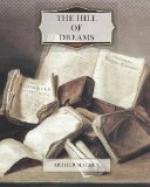He thought that such happy mornings well repaid him for the anguish of depression which he sometimes had to suffer, and for the strange experience of “possession” recurring at rare intervals, and usually after many weeks of severe diet. His income, he found, amounted to sixty-five pounds a year, and he lived for weeks at a time on fifteen shillings a week. During these austere periods his only food was bread, at the rate of a loaf a day; but he drank huge draughts of green tea, and smoked a black tobacco, which seemed to him a more potent mother of thought than any drug from the scented East. “I hope you go to some nice place for dinner,” wrote his cousin; “there used to be some excellent eating-houses in London where one could get a good cut from the joint, with plenty of gravy, and a boiled potato, for a shilling. Aunt Mary writes that you should try Mr. Jones’s in Water Street, Islington, whose father came from near Caermaen, and was always most comfortable in her day. I daresay the walk there would do you good. It is such a pity you smoke that horrid tobacco. I had a letter from Mrs. Dolly (Jane Diggs, who married your cousin John Dolly) the other day, and she said they would have been delighted to take you for only twenty-five shillings a week for the sake of the family if you had not been a smoker. She told me to ask you if you had ever seen a horse or a dog smoking tobacco. They are such nice, comfortable people, and the children would have been company for you. Johnnie, who used to be such a dear little fellow, has just gone into an office in the City, and seems to have excellent prospects. How I wish, my dear Lucian, that you could do something in the same way. Don’t forget Mr. Jones’s in Water Street, and you might mention your name to him.”
Lucian never troubled Mr. Jones; but these letters of his cousin’s always refreshed him by the force of contrast. He tried to imagine himself a part of the Dolly family, going dutifully every morning to the City on the bus, and returning in the evening for high tea. He could conceive the fine odor of hot roast beef hanging about the decorous house on Sunday afternoons, papa asleep in the dining-room, mamma lying down, and the children quite good and happy with their “Sundays books.” In the evening, after supper, one read the Quiver till bedtime. Such pictures as these were to Lucian a comfort and a help, a remedy against despair. Often when he felt overwhelmed by the difficulty of the work he had undertaken, he thought of the alternative career, and was strengthened.




